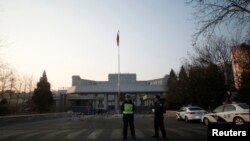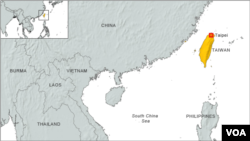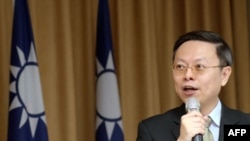Welcome to As It Is from VOA Learning English. I’m Mario Ritter.
In the last two weeks, international leaders have criticized trials of activists in Beijing.
Today we hear some of the details of the cases. Then, we hear about proposed talks between mainland China and Taiwan.
Activists on trial in China and China-Taiwan talks are next on As It Is.
Rights Activists Are Sentenced in Beijing
China’s Communist Party is continuing its campaign against government critics. Last Wednesday, a court in Beijing found two more activists guilty of the charge of “gathering a crowd to disturb public order.” Steve Ember has more.
Hou Xin and Yuan Dong are members of the civic group known as the New Citizens Movement. The group has been calling on government officials to make their financial information public. It has also called for equal rights to education for the children of China’s millions of migrant workers.
Yuan Dong was sentenced to one and a half years in prison for taking part in public demonstrations. Hou Xin was not sentenced to time in prison because her crime was considered “less serious.”
Less than two weeks ago, the Beijing intermediate court sentenced the creator of the New Citizens Movement, Xu Zhiyong, to four years in prison. The 40-year-old lawyer was found guilty of the same charge of “gathering crowds to disrupt public order.” He is one of seven members of the movement accused of taking part in five incidents. Lawyers for the accused have argued that they should all be tried together. But legal officials have brought separate cases against each.
In addition to measures against corruption, the New Citizens Movement has called on China’s provinces to let children attend school and take college entrance examinations where their parents live and work. The country has had a family registration, or Hukou, system in place since the 1950s. The policy limited the movement of families around China for many years. But, in recent years, a mass migration of rural people to the cities has caused families to be separated because of the Hukou system.
The New Citizens Movement has called for reforms to the system. Many of China’s provinces have promised reforms, but not Beijing and Shanghai.
Members of the group also call for good governance practices and observance of the law.
Many nations have condemned the sentencing of New Citizens Movement members and its founder Xu Zhiyong.
Daniel Delk is with the U.S. Embassy in Beijing. He spoke about the recent court decision involving New Citizens Movement member Yuan Dong.
“We’re deeply disappointed that Yuan Dong, a good governance advocate, has been convicted and sentenced to one and a half years in prison. We are concerned that today’s conviction, like that of legal scholar and rights advocate Zu Zhiyong just earlier this week is retribution for his public campaign to expose official corruption and for the peaceful expression of his views.”
The U.S. State Department says it is concerned that the sentences represent punishment against the activists for the public campaign against corruption.
China’s foreign ministry reacted to world criticism of the trials by saying that other countries should not interfere in China’s issues.
Xu Zhiyong’s lawyer has said he will appeal the court’s decision.
I’m Steve Ember.
China and Taiwan Agree to Talks
Next, Taiwan says it will hold high-level talks with China this month. The two sides are likely to talk about issues related to China’s goal of unifying the two sides. June Simms has this report.
Taiwan said last week that its China policy expert, Wang Yu-chi, would meet with China’s Vice Foreign Minister Zhang Zhijun in the cities of Nanjing and Shanghai from February 11 to 14.
Wang Yu-chi spoke to reporters in Taipei last week. He said the talks would not deal with sensitive political issues. But he said they are aimed at improving communication to avoid misunderstandings. He added that economic ties would be a main subject.
The two ministers also are expected to discuss establishing some kind of diplomatic offices in each other’s area. Such offices would service travel by the rising number of visitors between the mainland and Taiwan.
Nathan Liu is a professor of international affairs at Ming Chuan University in Taiwan. He says these meetings could offer a chance to discuss difficult political issues. However, he notes public opinion on both sides is important.
Some opposition lawmakers in Taiwan have already expressed concern about the trip. Hong Cai-Long is a top member of the opposition Democratic Progressive Party. He says the Taiwanese people are very concerned about human rights in China.
Ruling party lawmaker Lin De-Fu said negotiator Wang Yu-chi should speak with lawmakers before his trip. He said the negotiator should explain the purpose of his trip and take suggestions from political parties.
Mainland China and Taiwan have had separate governments since the Chinese civil war that ended in 1949. China claims rule over the island, and has threatened to use force to bring the two sides together. In 2008, however, the mainland and Taiwan negotiated trade and investment deals, which seemed to weaken the conflict.
The public in democratic Taiwan has long distrusted the idea of talks with its Communist neighbor. Last year, however, Chinese President Xi Jinping urged Taiwan to start political talks. China’s Taiwan Affairs Office called the meeting an important move to develop relations between the two sides.
I’m June Simms.
That’s As It Is for today. Thanks for joining us. Have a question or comment about our show? We would love to hear from you. Email us at learningenglish@voanews.com. Or you can visit our website at learningenglish.voanews.com. We are also on Facebook, YouTube, LinkedIn, iTunes and Twitter at VOA Learning English.
VOA world news is coming up at the top of the hour, Universal time.
I’m Mario Ritter for As It Is. I hope you will join me again next week.
We are sorry, but this feature is currently not available








